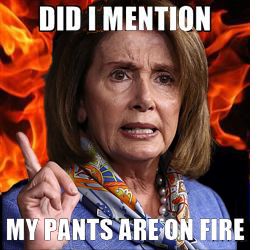“Let’s return to regular order,” Mr. McCain said on the floor of the Senate.
Diana Bauer and I mused about accomplishments this morning. “Everybody is yapping,” she said, “but we aren’t accomplishing much.”
“Our deliberations can still be important and useful, but I think we’d all agree they haven’t been overburdened by greatness lately. And right now they aren’t producing much for the American people…
We’ve been spinning our wheels on too many important issues because we keep trying to find a way to win without help from across the aisle. That’s an approach that’s been employed by both sides, mandating legislation from the top down, without any support from the other side…”
Mr. McCain has certainly noticed the same problem.
“You write op-ed every week,” Ms. Bauer said. “Do you think you’ve changed any minds?”
It’s a good question and shows that this writing stuff is the very antithesis of a good engineering job.
“We’re getting nothing done. All we’ve really done this year is confirm Neil Gorsuch to the Supreme Court. Our healthcare insurance system is a mess. We all know it, those who support Obamacare and those who oppose it. Something has to be done. We Republicans have looked for a way to end it and replace it with something else without paying a terrible political price. We haven’t found it yet, and I’m not sure we will. All we’ve managed to do is make more popular a policy that wasn’t very popular when we started trying to get rid of it.”
The Neil Gorsuch appointment shows how a job used to work:
Goal:
Fill a vacancy on the U.S. Supreme Court.
Steps:
List the best candidates for the job.
Nominate Mr. Gorsuch.
Hold hearings in the U.S. Senate.
Confirm the appointment.
Make good:
Mr. Gorsuch is sworn in.
Back in about 1980, I honchoed the design of an industrial machine that accepted a flow of books or magazines and stacked them in an even pile so the “extra” paper around the edges could be trimmed off. It worked a treat; we installed them around the U.S. and Europe in printing plants to produce everything from Playboy to Reader’s Digest with a stop at TV Guide.
 In order to get those magazines into your hands, I looked at the existing stackers on the market and found that they couldn’t keep up with the throughput particularly of the thin, fast moving magazines like the two-up Digest or TVGuide. That defined the problem. A number of people on my team and over in the sales offices researched what the market needed and how many we might sell because there was no way we’d spend a gazillion dollars of design time and tool up for a machine that sold three copies. The requirements came out of that research. We dreamed up and discarded a lot of solutions and homed in on the best. One of my designers at the time was arguably the best, most creative machine guy I’ve met anywhere; he did the layout. The guys in the model shop downstairs built a prototype and we tested it right there in our own plant. I installed the first one in, I think, Offenburg Germany.
In order to get those magazines into your hands, I looked at the existing stackers on the market and found that they couldn’t keep up with the throughput particularly of the thin, fast moving magazines like the two-up Digest or TVGuide. That defined the problem. A number of people on my team and over in the sales offices researched what the market needed and how many we might sell because there was no way we’d spend a gazillion dollars of design time and tool up for a machine that sold three copies. The requirements came out of that research. We dreamed up and discarded a lot of solutions and homed in on the best. One of my designers at the time was arguably the best, most creative machine guy I’ve met anywhere; he did the layout. The guys in the model shop downstairs built a prototype and we tested it right there in our own plant. I installed the first one in, I think, Offenburg Germany.
That’s the way it’s supposed to work.
The Pilemaker went from defining the problem to making good on the solution — you reading a magazine. Or at least gazing at the foldout.
That’s the way writing op-ed and governing are supposed to work, too.
I want my columns to change the way you think or, better, to get you to take action. That’s my goal. The make good is when you do volunteer for a community group or throw the bums out of Washington.
We want the legislature to complete the tasks we set for them. That’s our goal; it should be every Congress Critters’ goal as well. The make good is when we see a bridge built across the Rock River or a health care system that works.
I have no way other than persuasion to strong arm you into completing my goal but we can force Congress to do so.
We can elect new ones.
Give them a check list.
Remind them that they lose their jobs when they don’t make good.
And then follow through.
Thank you, John McCain. You got us part way there.



 Rather than wait for the Congressional Budget Office score and for outrage to build, Mr. Ryan wants to hurry the legislation through the committee stage in a few days. The reason for the rush should be obvious: the more you look at the Unaffordable American Health Care Act, the more unhealthy it appears.
Rather than wait for the Congressional Budget Office score and for outrage to build, Mr. Ryan wants to hurry the legislation through the committee stage in a few days. The reason for the rush should be obvious: the more you look at the Unaffordable American Health Care Act, the more unhealthy it appears.